Over the past few years, Richmond, VA has become home to the best audio industry conference out there — the Resonate Podcast Festival.
Months ago, festival organizer Chioke I’Anson asked me to speak on behalf of the Association of Independents in Radio. AIR is a 30+ year-old membership organization that supports audio creators in all sorts of ways, and I joined the board this year. The idea is that I would speak about the importance of community, especially at a time when things have been so turbulent and uncertain. Of course I said I would do it, and then I didn’t think about it again for a long time. Instead, I experienced what so many of us are experiencing right now: a work dry spell and a lot of anxiety about the industry overall. So when it came time to prepare my talk, I truly didn’t know what to say.
The talk was titled Building Resiliency through Community in Turbulent Times. But I wasn’t feeling resilient. In fact, I was feeling beat down: some combination of world weariness and job weariness. When I finally sat down to write, I decided to write what I wanted to hear. I needed a pep talk and a reminder of what I love about this community and this industry. So this is what I came up with.
For those who were in the room, I’ve included links to all the organizations I cited. And if you weren’t there, I hope this provides you with a small glimpse into the collective spirit of the incredible community I’ve been privileged to be a part of for the last 20+ years.
If you’ve spoken to me or read my substack in the last two years, you know that I have a lot of ideas. And I get very excited about those ideas. But I have to be honest — I don’t have the answers.
I’m in this shit right along with you.
I don’t have enough work right now.
I’m worried about my bank account.
I’m worried about the world.
I’m lonely a lot of the time.
I like having regular colleagues and I miss that every day.
It’s been rough. And I don’t know how to solve this. But when Chioke asked me to speak on behalf of AIR, I was reminded about what an incredible community we have here. And how this community is and always has been collaborative and cooperative. And no matter what happens to the economy, or how many podcast companies pop up and then fold or get acquired; no matter how many rounds of layoffs we have to face; they can’t take this community away from us.
So what I hope to offer in the next 20 minutes or so is some perspective from someone who’s been in it for a while, and an explanation of why I’m still hopeful and enthusiastic about what we can create together.
I’m going to start with a quote that I find really inspiring, and then I’m going to share a couple case studies from my own life before looking at some of the amazing collaborative work that’s being done by others in our community.
The quote is from adrienne maree brown, the author of Emergent Strategy. Thank you to Sara McCrea for introducing me to this book. Speaking of community, I’m incredibly grateful to have Sara as part of mine.
adrienne uses a lot of nature metaphors in her work. I live in a rural area and I take great comfort in the outdoors so this really speaks to me. Here’s what adrienne says:
If you are here at Resonate, you are already a part of this flock of strange birds — working independently together. I love this vision, and I encourage you to think about your own flock throughout this presentation.
The first story I want to share is an example of creative flocking from my non-work life.
This story starts in 2020. We all know what was going on at that time. My neighbors and I had been taking bets about when school would reopen and we were all wrong. When we learned that the entire 2020-2021 school year would be “hybrid learning” we had to get creative.
All of us were working parents. Some of us had to physically go to work and the rest of us had to navigate an endlessly complex schedule of in-person school and home school. There was no way we’d be able to manage that and also do our day jobs. So my neighbor on Fruit Bud Lane in Red Hook decided to convert her garage into a one-room classroom, and Fruit Bud School was born.
There were eight kids in Fruit Bud School: 4th grade through 8th grade. And there were five parents who could supervise the kids at various times throughout the week. We created a schedule so we could all balance kid supervision and our day jobs; none of us had to be on kid duty all day every day. It was a lifesaver for the working parents, and I think it was fun for the kids, too.
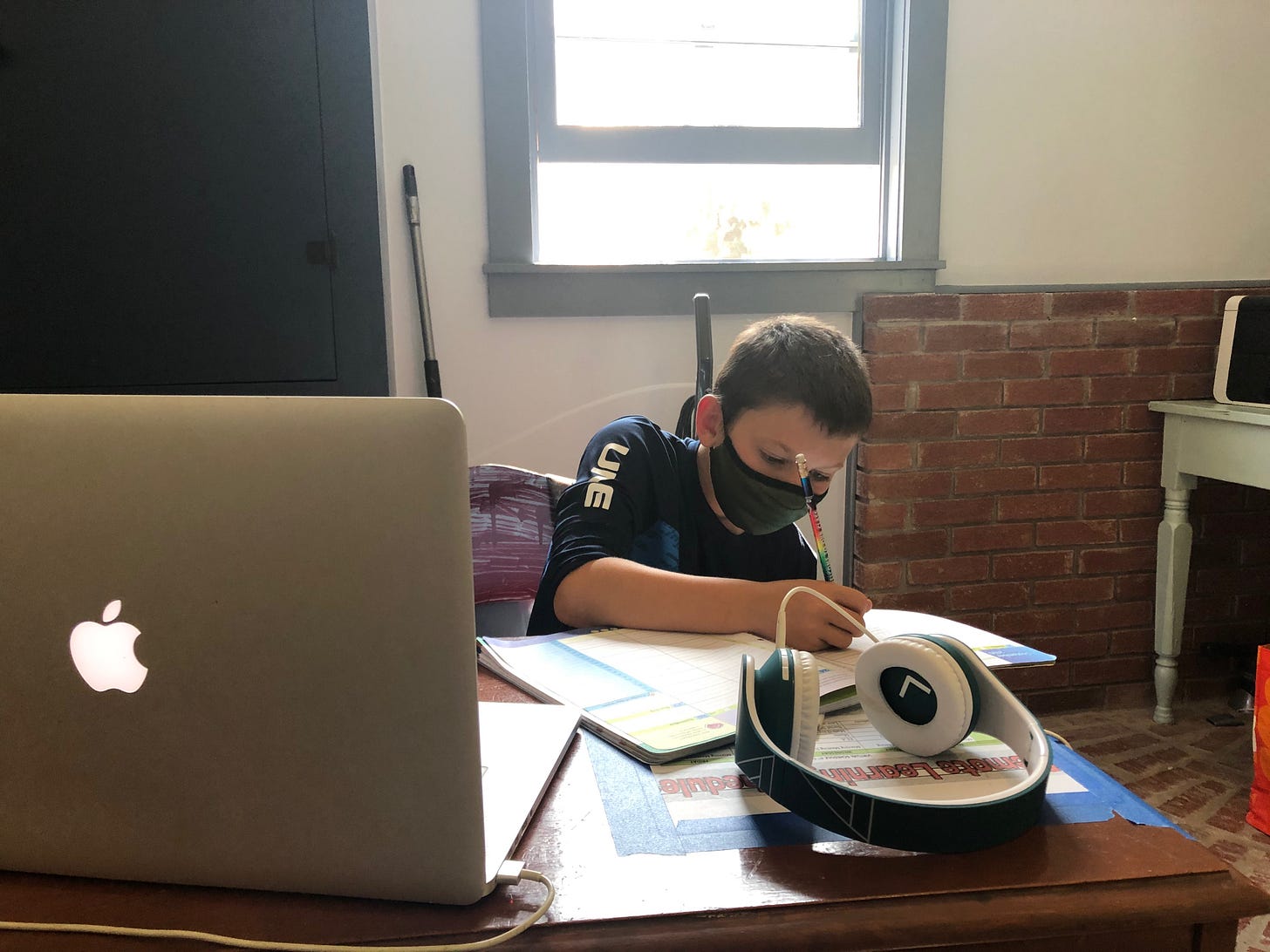

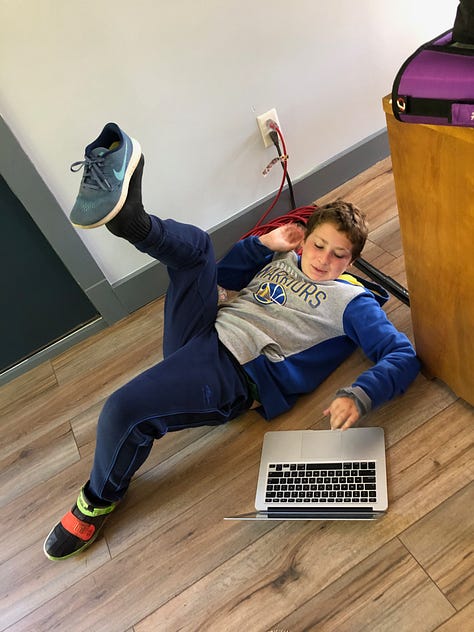
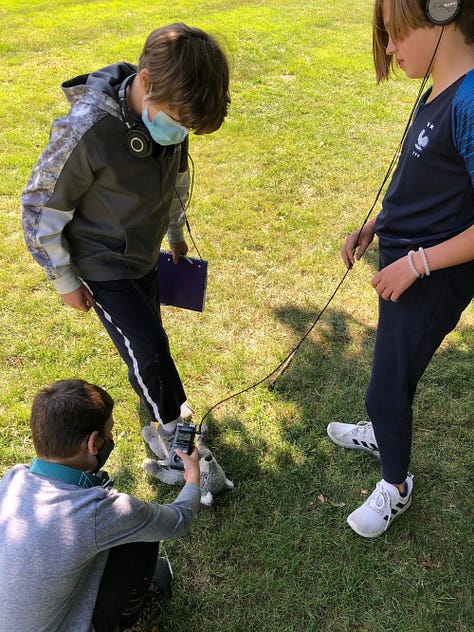
Fruit Bud School became their new normal. One of the parents was a former math teacher so he helped the kids with their math homework. Another parent was great at coming up with fun physical activities for the kids to do during gym class. I even got them doing a little audio recording — though I honestly have no idea what they were doing with that bear.
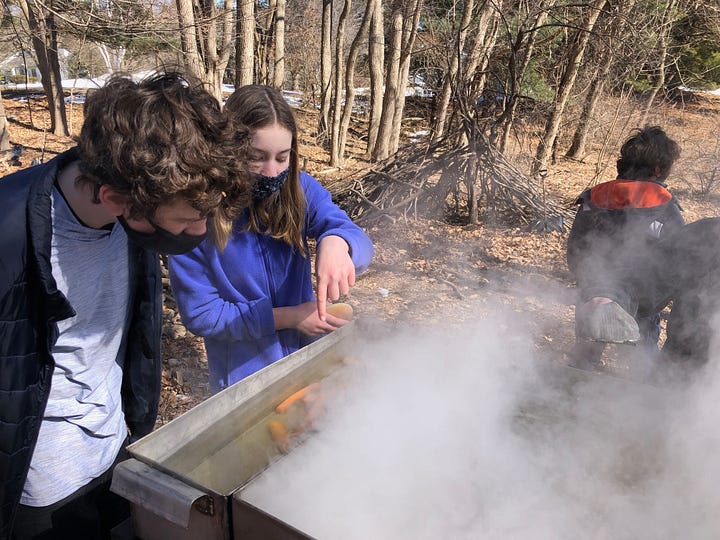
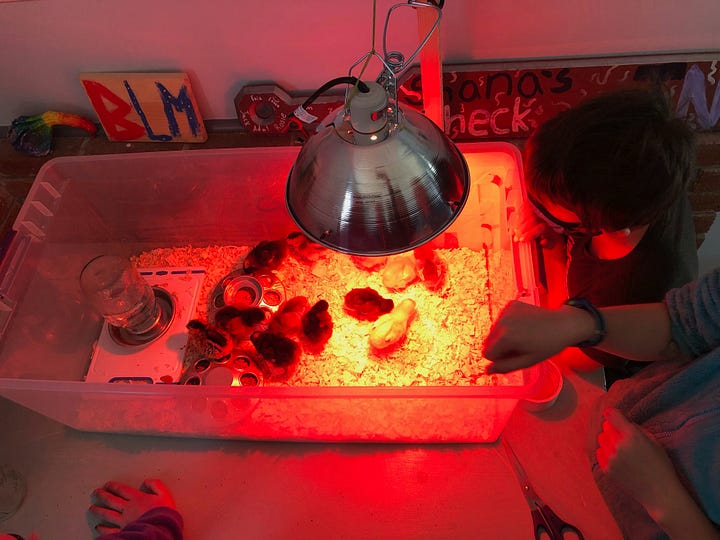
We did science experiments. In this one the kids are cooking hot dogs in maple sap. Conclusion — they are delicious.
We also raised chickens. They are adorable.
This picture is from their Halloween party. And on this day, all the houses on Fruit Bud Lane put candy out at the bottom of their driveways so the kids could do a COVID version of trick or treating.
Despite all the challenges of that year, and when so many people were suffering such terrible losses, it was actually a magical time for these kids. Maybe they didn’t learn as much as they would have in regular school. But they had fun, they made memories, and they learned a lot about what communities can accomplish together.
That is the power of a neighborhood flock.
Back to audio. And back in time to the summer of 2003.
I was two years out of grad school at that time and I had a job at Youth Radio. This was the job I had gotten right out of grad school and a lot of it was great. But I was being paid next to nothing, I had no benefits, and it was time for a change.
So I quit — and I decided to try freelancing.
I was living in Oakland at the time but landed a temporary job as a fill-in producer at the Tavis Smiley Show in Los Angeles. I moved down there for a little while. And I was working the 3 AM to 11 AM shift.
I won’t get into the details, but it wasn’t an ideal job and when my contract ended, I didn’t try to stay. I returned to Oakland where I struggled to find more work. I was pretty broke, I was lonely, the US had gone to war with Iraq, Arnold Schwarzenegger had become Governor of California… You get the picture.
My strongest memory of that time was listening to Beck’s Sea Change album on repeat. And this song in particular.
It wasn’t a great time.
And I decided to leave media all together.
I took a full time job at a tech company in Silicon Valley. And for a long time, I didn’t look back.
It turns out it’s not so easy to leave journalism behind. Silicon Valley was fascinating, but I missed the storytelling. And I missed doing something that felt important. I had soured on the job and they had soured on me. I was laid off, and in the fall of 2006, I attempted freelancing again.
This time I vowed that things would be different. I felt like I had to re-introduce myself to the journalism world after being gone for so long. And I needed to start rebuilding my network. Social media was just starting to take off at that time and blogs were all the rage. So I started one.
I called it “Freelance Cafe” because I was freelancing, and I loved to work in cafes.
The posts were really short — links to articles that caught my attention, mentions of like-minded organizations, events that were happening throughout Oakland and around the Bay Area. I fantasized about opening a co-working space where blog readers could congregate, and I publicly mused about the industry that I was re-entering.
A few months later, I organized the first Freelance Cafe meetup.
This was purely selfish — I missed my grad school friends and a bunch of them were still working in and around Oakland. So we met up for drinks. And then we met the following month. And then we had a holiday celebration. And then we invited a CPA to talk to us about taxes.
We grew from about half a dozen to more than 150 members across the Bay Area. And it became a wonderful, supportive community for many years. This was my new flock. And I’m not exaggerating when I say:
Every single work opportunity I got during this time came through this network.
Every. Single. One.
Freelance Cafe went on for a long, long time.
Through the birth of one kid, a cross-country move, the birth of a second kid, and the birth of Revisionist History. I stopped freelancing for a long time, though I kept posting…
2009… 2011…2013… 2015… 2017… 2019… 2020…
And here we are.
I don’t need to tell you how we got here. We’ve all lived it together. Some of us burnt out and chose to leave our jobs. Others were laid off — sometimes more than once. Many of us are holding on by a thread.
And yet — in the summer of 2023, when I decided to “re-open the cafe” and convert my blog to a substack, I was overwhelmed with an outpouring of enthusiasm and support. 900 people were still on my email list and I received dozens of “welcome back” messages: notes from people I hadn’t heard from in years saying “I’m so happy to see you in my inbox again.” My flock invited me right back in.
I want to share another quote with you — from another book recommended to me by the amazing Sara McCrea. This one is from Rebecca Solnit’s book A Paradise Built in Hell. She’s talking about what happens during disasters.
I love this. And I know it’s true. I’ve seen it and experienced it in this community time and time again.
Our industry has always been about community and resourcefulness.
Take a look at this line from NPR’s original mission statement written by Bill Siemering in 1970. Number 4 on their list of “purposes”:
Cooperation is sewn right into the fabric of the organization.
There are so many more examples of this:
AIR was founded in 1988 by a group of freelance producers who gathered around a kitchen table in New York City to talk about what was and wasn’t working in their audio careers. A little while later, they formed a non profit.
In 2013, Brendan Baker, Nina Porzucki, Audrey Quinn, and Matthew Long-Middleton met at Third Coast and decided to create an online forum for New York-based indies to share resources. As we all know there are now thousands of people on that list. It’s become the go to free resource for all things public radio and podcasting well beyond New York City.
In 2017, indie creators Tamar Avishai and Wade Roush co-founded the Hub and Spoke Audio Collective to house a network of creator-owned, high-quality narrative shows. That same year, Arielle Nissenblatt created the EarBuds Podcast Collective to encourage more listening and help with podcast discovery – long before we learned we had a “discovery problem”.
Over the last few years, so many other organizations and support networks have been built by and for creators.
Juleyka Lantigua created the Podcasting, Seriously Fund specifically to support BIPOC, queer, and transgender creators.
Talia Augustidis created the All Hear Newsletter collating all the audio resources you could ever want in one place.
Corey Gumbs created the Black Podcasters Association to amplify Black voices in the podcasting industry.
Lauren Passell created Tink Media and the free Podcast Friends List to encourage promo swaps between creators.
Danielle Desir Corbett started the Grants for Creators substack packed with fundraising opportunities.
Sara McCrea created the Early Career Audio Collective to build a support network specifically for newer creators.
And of course — the OGs — Julie Shapiro and John DeLore created Audio Flux to give us all a new sandbox to play in.
There are so many more examples of this.
What’s important is that every one of these projects was started by independent creators to help other independent creators collectively.
Our industry has always done this.
And no economic downturn can take that away from us.
No corporate shenanigans can dull our cooperative spirit.
No fiscal mismanagement… or AI technology… or post-truth politics can change the altruistic history that defines our community of makers.
So what now?
Knowing our rich history and the existence of all these wonderful support organizations is great. But we still wake up feeling lonely and burnt out and beat down. I still regularly listen to sad music and feel sorry for myself. Preparing for this talk I had many days of “I can’t do this. I don’t have anything figured out.”
But I work hard to shut down that negative voice. And I’ve come up with four calls to action that help me continue to move forward, and to remember what’s important. Starting with this:
Be gentle with yourself.
We are going to have bad days. Days when we feel like we’ll never work again. Days when it feels like the industry is too far gone and that we have no place in it anymore. And it’s ok, on those days, to mourn a little bit. It’s ok to play hooky and eat raw cookie dough and cry to a friend.
It’s also ok to step away.
It’s ok to take a job just to make ends meet.
It’s ok do that branded project or that chat show that doesn’t fill your soul with joy.
It’s even ok to to step out of the industry entirely.
I can tell you from experience that it will be here waiting for you with open arms if and when you’re ready to come back.
Number two: Find your Flock
Flocks come in all shapes.
You can join one of those organizations I mentioned.
You can seek out an accountability buddy or other partner to bounce ideas off of.
You can participate in a WhatsApp group or a text thread.
You can join a bookclub. Or a filmclub.
You can attend a regional AIR meetup.
If there isn't already a regional meetup where you live, start one.
Pull together a small group of friends or colleagues to work on something new. Maybe it has absolutely no commercial value but it brings you joy.
Whatever it is, share it with someone.
Being independent doesn’t mean being alone. We are birds of a feather — we flock together.
Number three: Demand Fair Rates
There would not be a podcast industry if it weren’t for the people in this room.
WE are the experts at our craft.
WE are the storytellers, the producers, the editors, the engineers, the composers, the marketers, and the publicists who make all the content possible.
WE know what it takes to make the shows and to make them sing.
WE know how to get them done on time and on budget.
And WE — collectively — need to be the ones to determine sustainable wages for ourselves.
Thank you to everyone who filled out the AIR rate survey. We are analyzing the data and we’ll be coming out with our recommendations in the next couple months. It’s not going to be Alex Cooper or Dax Shepard rates. But if we know our worth and stick to our collective guidelines, WE have the power to shape our industry's future with a focus on sustainability.
And finally:
Number four: Lead with Empathy and Kindness
We are living in a divided and sometimes cut-throat world. But as storytellers we are uniquely trained to look past those hard outer layers and uncover the more nuanced middle. We know that hearing someone else's perspective is a gift, and that by listening and sharing we can come to a deeper understanding, and then share that understanding with others. That empathetic approach serves us well in our reporting and producing and it can serve us well in our workplace interactions… Even when — especially when — the workplace can feel so brutally unfair.
Be kind to yourselves and be kind to each other.
It’s what we’ve always done.
This past year has been hard — really hard. And I wish I could end this talk by telling you that I’d figured it out — that I’ve found the perfect solution to fund long-form narrative storytelling and that we’re all going to make a livable wage doing just that for the foreseeable future. I don’t have the answers. But what I can tell you is that I am inspired by all the incredible work this community is doing.
I’m inspired by organizations like Mumble Media, Maximum Fun, Defector, 404 Media, and Hell Gate who are choosing cooperative models to run their businesses.
I’m inspired by creators like Yowei Shaw, Nichole Hill, Nina Porzucki, Golda Arthur, Kate Downey, Helen Zaltzman and so many others who are making original work on their own terms. They are becoming entrepreneurs in addition to creative storytellers.
I’m inspired by writers and thinkers like Samantha Hodder of Bingeworthy and Ayo Oti of Sounds like Impact, and Elaine Appleton Grant of Sound Judgment and Anne Helen Petersen of Culture Study, and Wudan Yan of the The Writer’s Coop and so many others who are pushing us to consider new ideas and to listen more critically.
In my own writing, I’ve been throwing wild ideas out there.
I’ve been brainstorming in public and planting seeds and calling for a revolution.
You have welcomed my ideas with so much enthusiasm and energy and for that I am so grateful.
You are my flock. And together, we’ll wing our way into a more sustainable and more equitable future.

PS: If you weren’t at Resonate and want to know what it was all about, Wil Williams of Tink Media live tweeted the whole thing and posted a summary. Amazing.



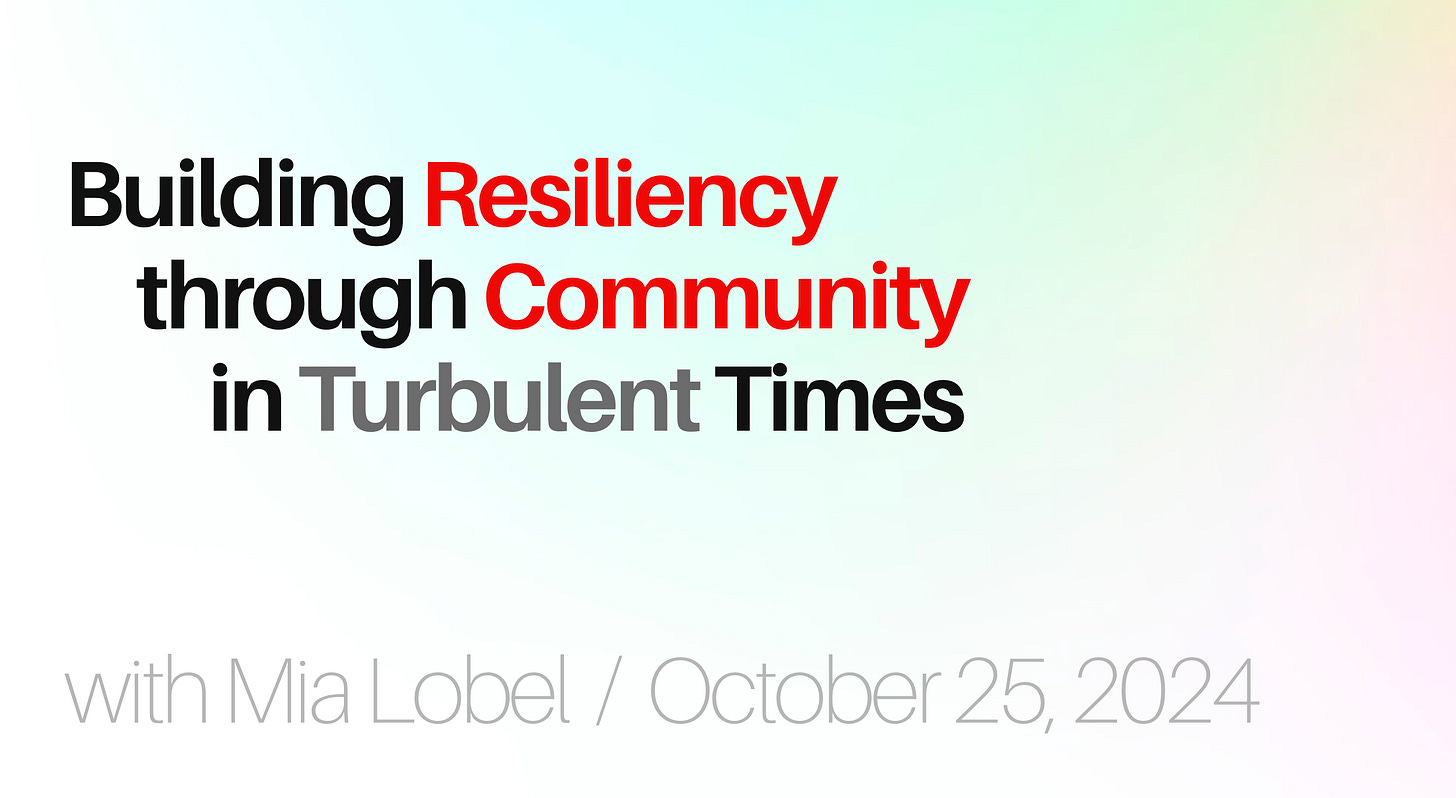


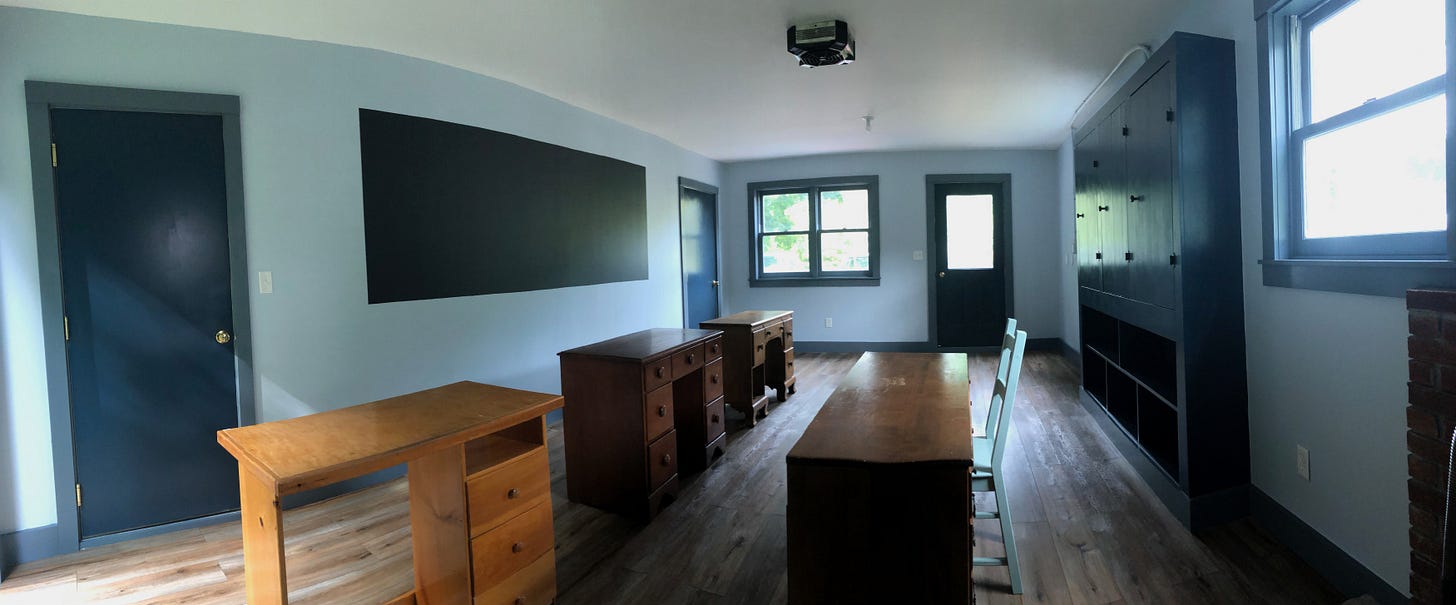

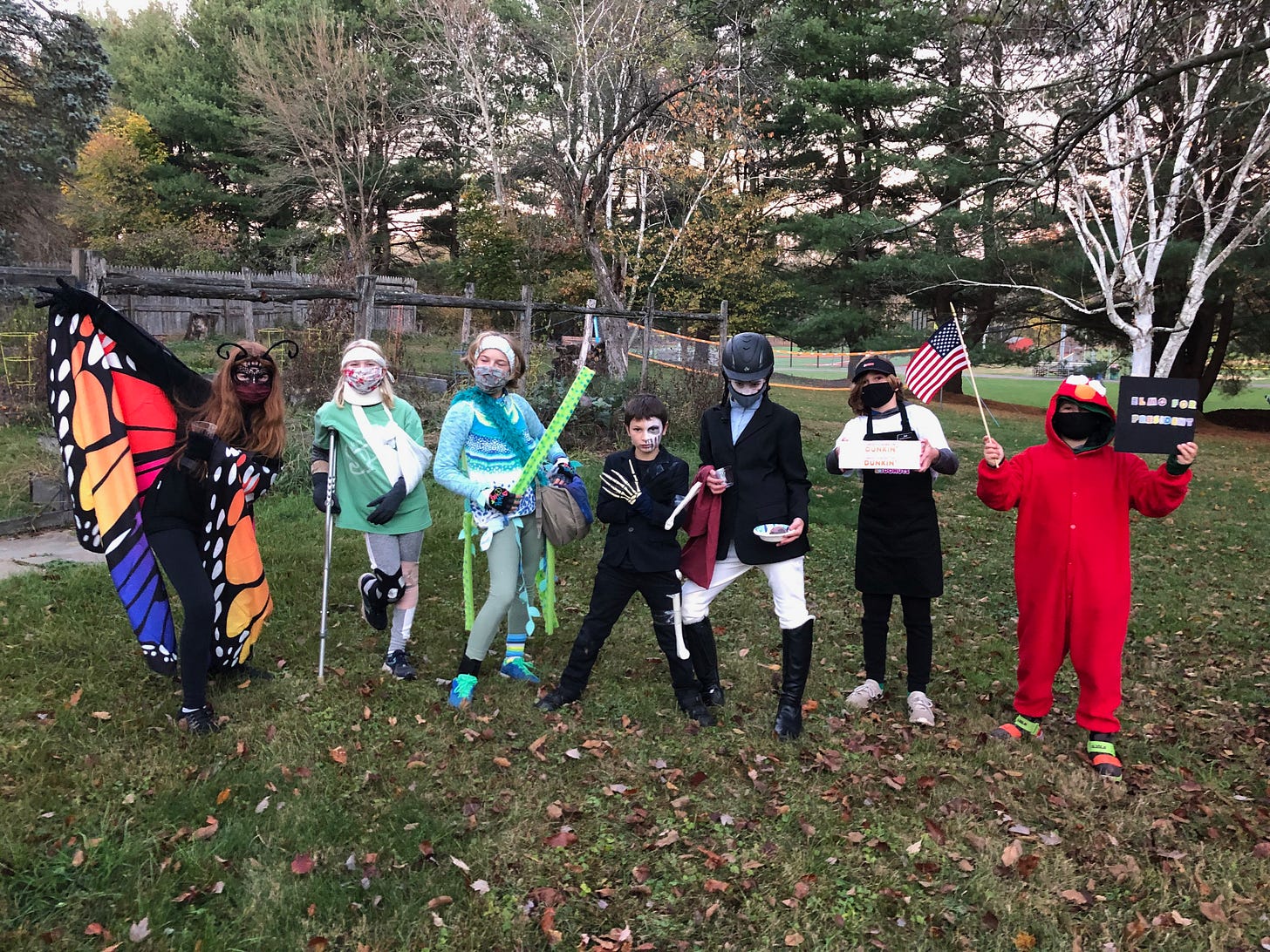










I'd heard so many good things about your talk, so am really glad you posted it (and thanks for the shoutout, very flattered!). Call me soon pls
I didn’t make it to Resonate, so thank you for sharing this! So encouraging and motivating to find community in this turbulent time.